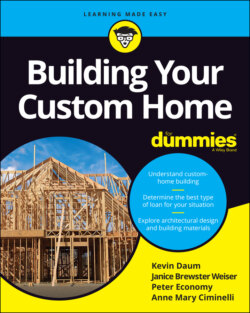Читать книгу Building Your Custom Home For Dummies - Peter Economy - Страница 84
Qualifying
ОглавлениеThe first thing a lender will ask is whether you intend to buy the land for your own personal use. The lot-financing rates and terms for owner-occupied properties are much better than for investment properties. The lender looks to see if it makes sense for you to move to this property. If you’re claiming it to be a second home, the lender will expect it to be in a resort type area or a city other than your primary residence. Buying the lot in a cheaper neighborhood on the other side of town from where you currently live will raise eyebrows.
The lender next assesses your qualification on the basis of your credit report, liquid assets (cash, stock, or other easily accessible forms of money), and your debt-to-income ratio (the amount of debt you carry in the form of loans and credit card balances versus your income). Your lender’s approach to these issues is very similar to how it will underwrite your construction loan (see Chapter 10 for the specifics). To make its decision, the lender wants to see, at minimum, the following documentation:
Appraisal
Credit report
Three months’ bank statements
Two years’ W-2s and recent pay stub
Two years’ tax returns, if self-employed
Lenders may loan you a higher percentage of the purchase price based upon the quality of your other qualifications. Being able to show good credit and sufficient income might get you a loan for up to 80 percent of the purchase price.
Many lot lenders are the same lenders that finance construction. You apply for a construction loan some months after you get the land. If the lender sees conflicting information regarding income or assets, the lender can turn you down. Therefore, understanding the requirements for lot loans and construction loans is critically important. (We explain construction loan requirements extensively in Chapter 10.) Lenders look in their files for any other loans they made to the same borrower. If the information is inconsistent, the lender simply rejects the loan.
One of the advantages of working with a mortgage broker is that they can act as a filter. By looking at your documentation, a good broker can determine which lender fits best with your project. Doing so keeps you from stabbing in the dark and providing too much information to the lender that may result in denial.
